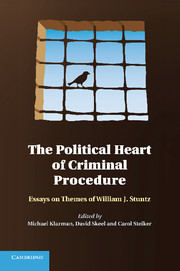Book contents
- Frontmatter
- Contents
- Contributor List
- Introduction: Appreciating Bill Stuntz
- Part I The Political Economy of Substantive Criminal Law
- 1 The Political Economy of Capital Punishment
- 2 Bill Stuntz and the Principal–Agent Problem in American Criminal Law
- 3 Overcriminalization for Lack of Better Options: A Celebration of Bill Stuntz
- 4 Stealing Bill Stuntz
- Part II Police Investigations
- Part III Emotion, Discretion, and the Judicial Role
- Index
- References
4 - Stealing Bill Stuntz
Published online by Cambridge University Press: 05 March 2012
- Frontmatter
- Contents
- Contributor List
- Introduction: Appreciating Bill Stuntz
- Part I The Political Economy of Substantive Criminal Law
- 1 The Political Economy of Capital Punishment
- 2 Bill Stuntz and the Principal–Agent Problem in American Criminal Law
- 3 Overcriminalization for Lack of Better Options: A Celebration of Bill Stuntz
- 4 Stealing Bill Stuntz
- Part II Police Investigations
- Part III Emotion, Discretion, and the Judicial Role
- Index
- References
Summary
George Orwell began his celebrated essay on Charles Dickens by remarking that Dickens was “one of those writers who are well worth stealing.…The Marxist claims him as ‘almost’ a Marxist, the Catholic claims him as ‘almost’ a Catholic, and both claim him as a champion of the proletariat.” Even Chesterton, Orwell pointed out, “credit[ed] Dickens with his own highly individual branch of medievalism.” Everyone wanted Dickens as an ally; everyone saw in him a sympathetic soul.
Bill Stuntz is the Charles Dickens of criminal procedure scholars. Burkean skeptics praise him as a model Burkean skeptic. Law-and-order conservatives enlist him in arms against the legacy of the Warren Court. Liberals embrace him as a critic of overcriminalization, excessive punishment, and inequality. Even scholars assigned to critique Stuntz's work have usually paused first to make clear that, really, on the important matters, they see eye to eye with him.
- Type
- Chapter
- Information
- The Political Heart of Criminal ProcedureEssays on Themes of William J. Stuntz, pp. 87 - 108Publisher: Cambridge University PressPrint publication year: 2011

